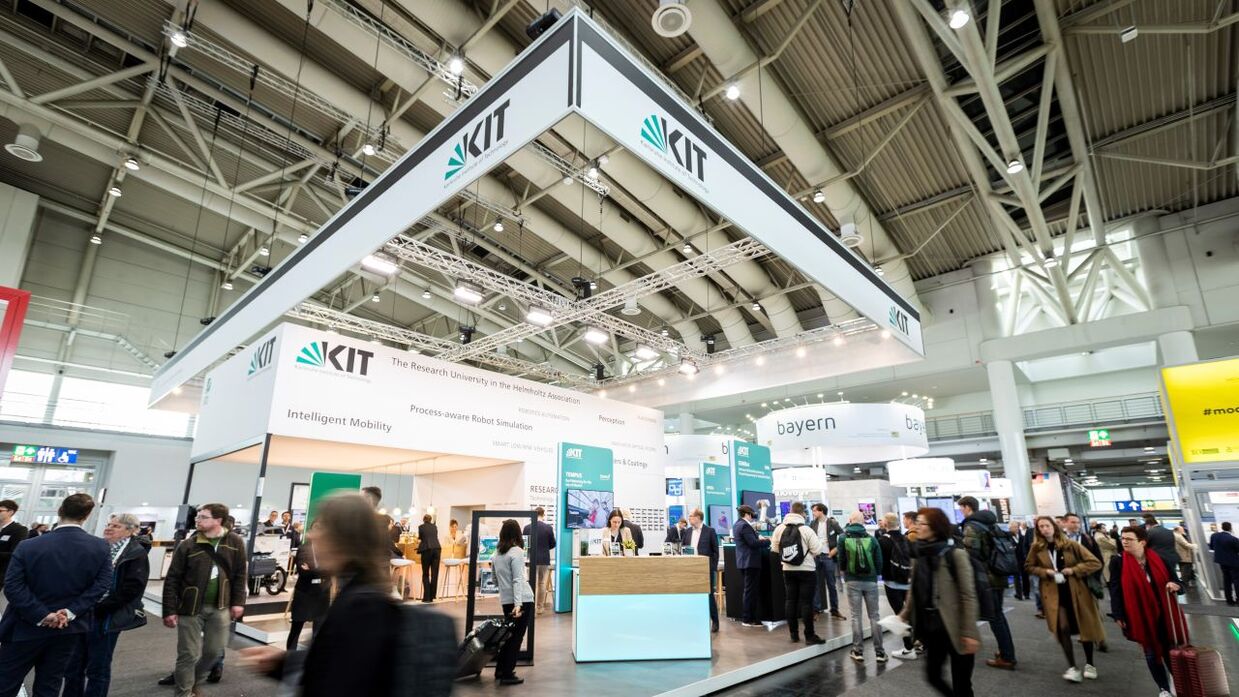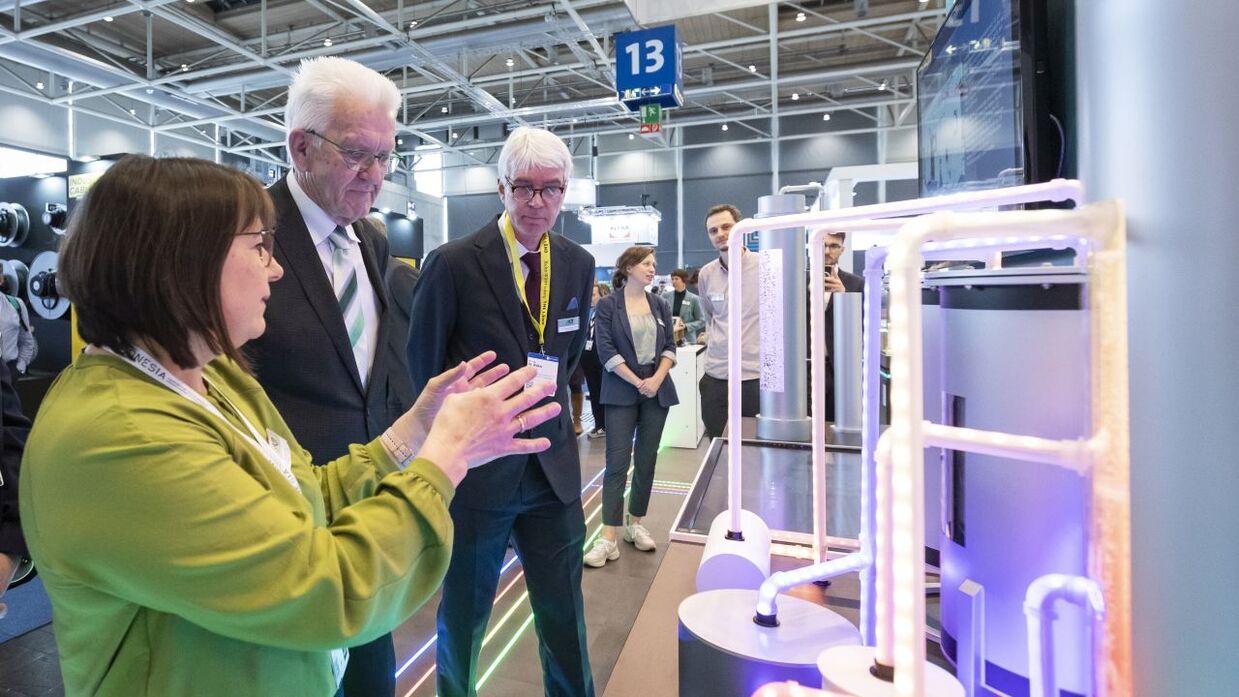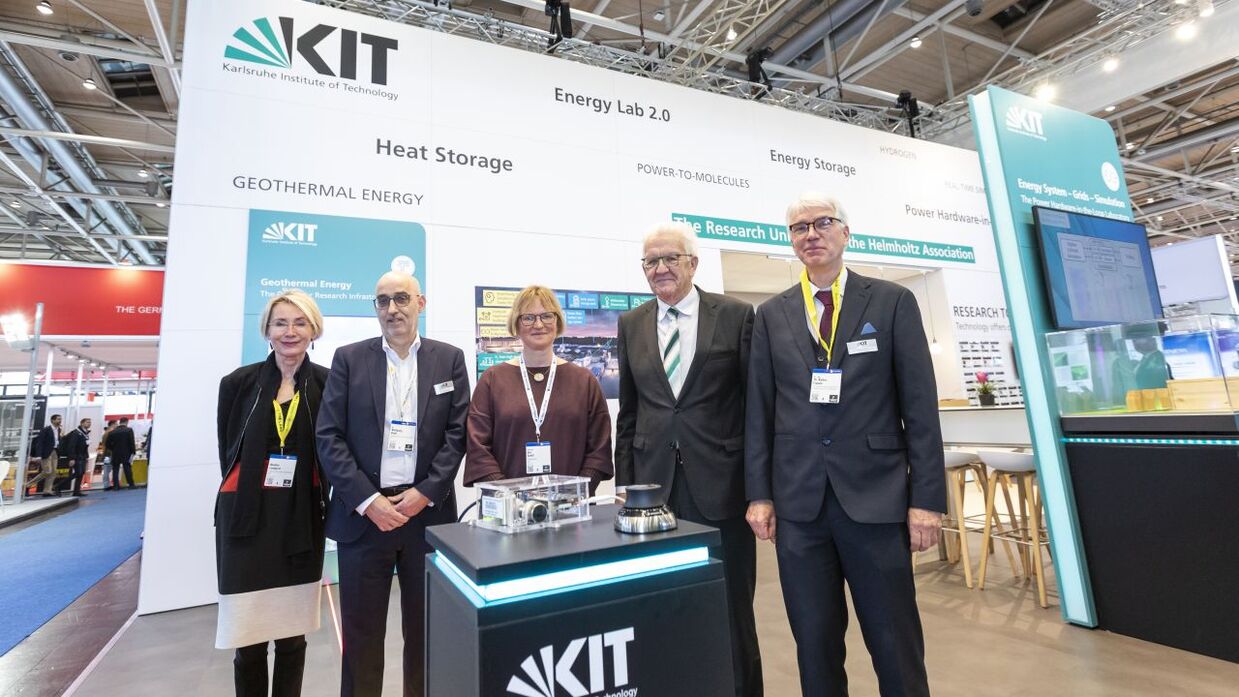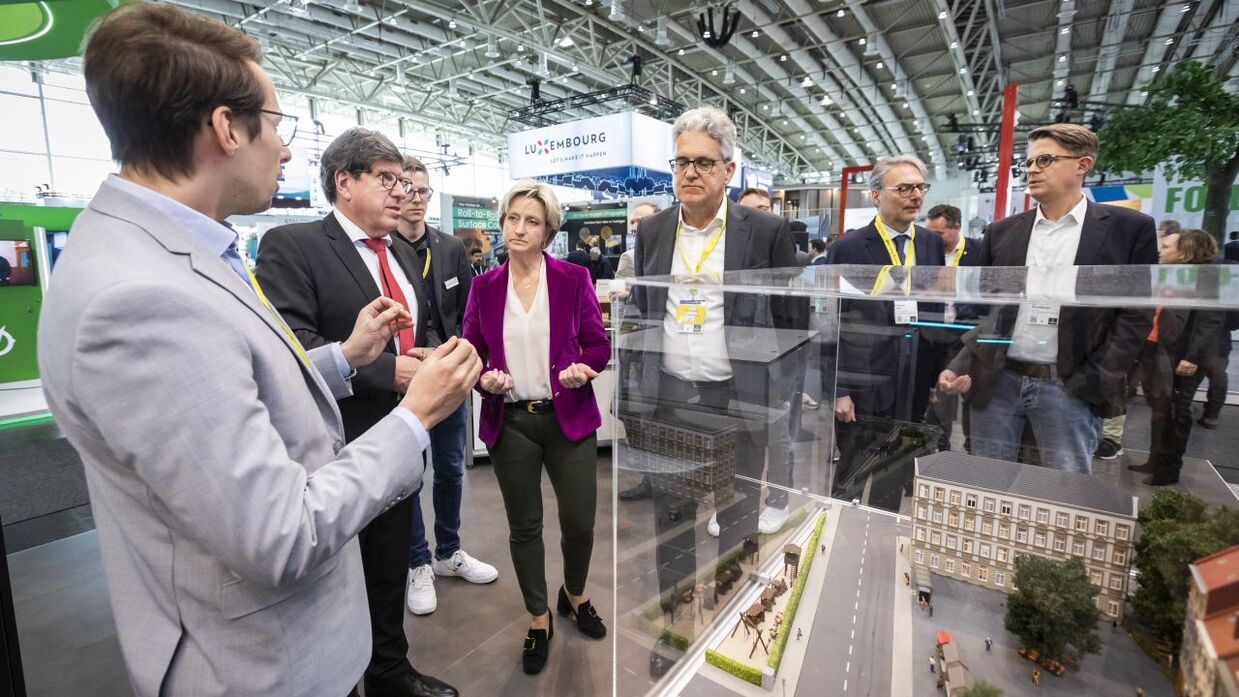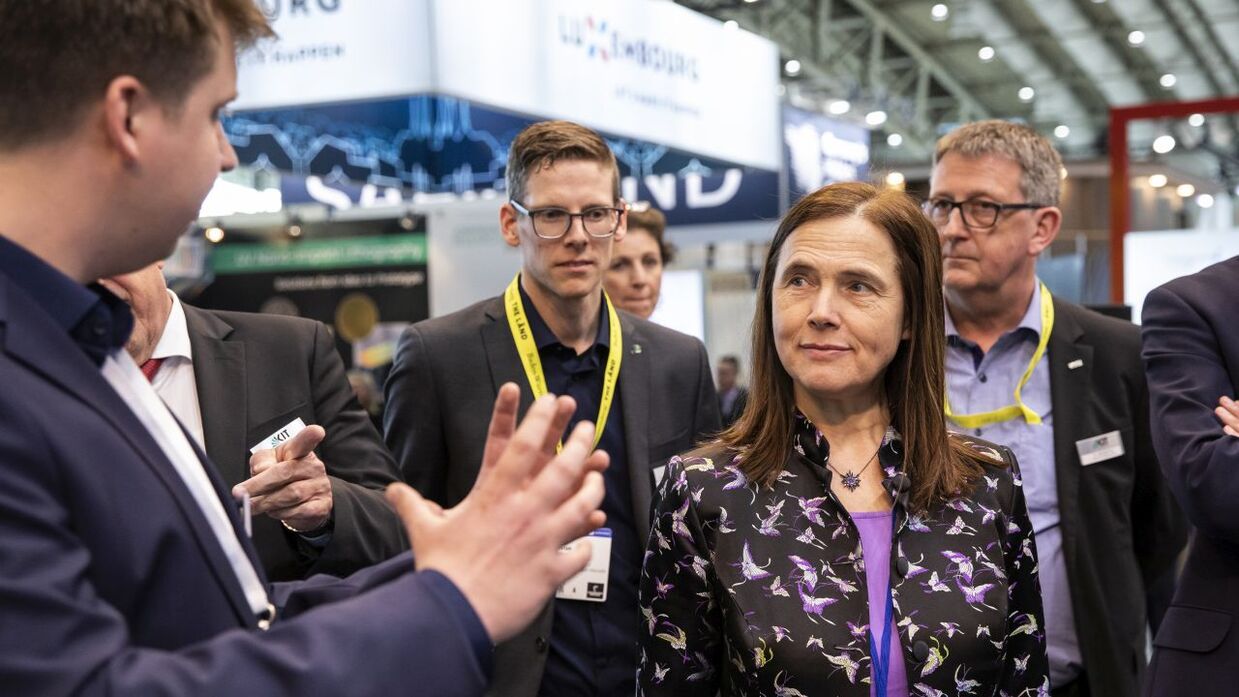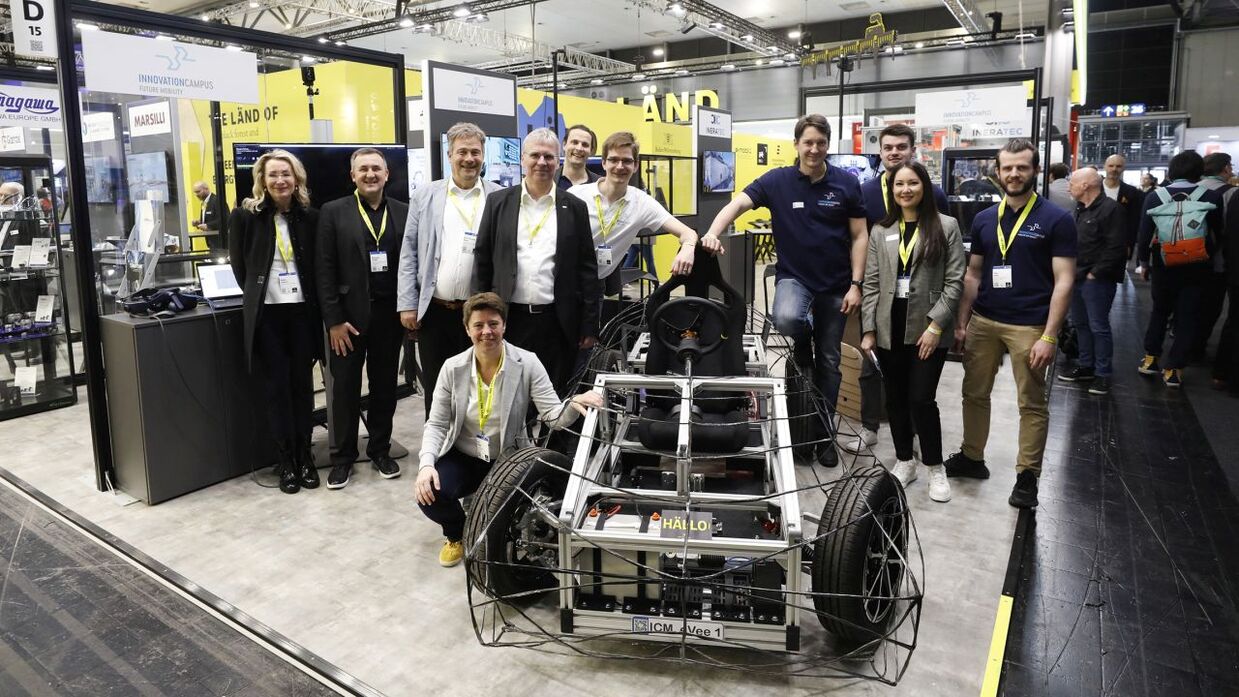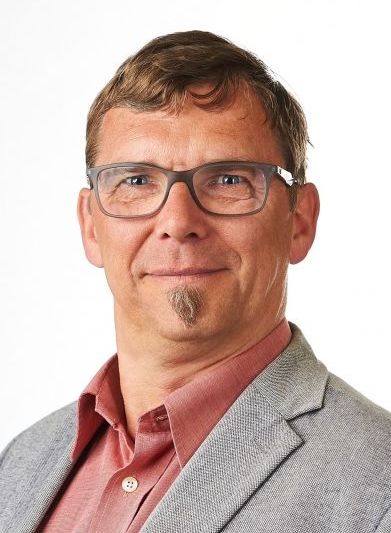KIT at Hannover Messe 2023
Simulation-based optimization of robot systems for flexible and precise production, automated buses for the urban traffic of the future, highly reflective mirrors from the inkjet printer, and AI methods for the mobility of people and goods are the major KIT topics in the Future Hub (Hall 2, Booth B45). At Energy Solutions (Hall 13, Booth C70), KIT's Energy Lab 2.0 will be the key issue: Europe's largest research infrastructure for renewable energies will focus on real-time systems for energy technologies, power-to-X, geothermal energy, and heat utilization, among others.
Further Information:
Press release Hannover Messe 2023: Sustainable Solutions for Mobility, Energy, and Industry
Future Hub
Hall 2, Booth B45
At „Future Hub“, KIT and FZI Forschungszentrum Informatik, an innovation partner of KIT, will present their projects at a joint stand.
TEMPUS Project
Autonomous Public Passenger Transport
The TEMPUS project focuses on autonomous bus platooning in the city of Munich. With the help of an “electronic” drawbar, buses can be connected to each other. Platooning is attractive not only for economic and ecological reasons. It also helps to balance fluctuating numbers of passengers. A model with realistic urban settings illustrates the challenges of bus platooning.
IJPOFs – Inkjet Printed Optical Filters
Additive Manufacturing of Application-specific Optical Filters
Whether machine vision, AR and VR technologies, autonomous driving, medical inspection, or laser material processing: Many applications require optical filters, which block or amplify a certain part of the spectrum. Inkjet Printed Optical Filters (IJPOF) enable to reduce manufacturing costs and increase customization flexibility: Inkjet printing simplifies the manufacturing of optical filters in the desired locations, sizes, and properties.
SDMBot
Software-based Process Empowerment for Industrial Robots
Software-based empowerment of robots in industry requires simulation tools that model the entire manufacturing process in a virtual environment. This includes robots, tools, and materials. For the open source software tools presented, robot simulations were extended to include process models such as milling, welding, or painting. The simulation enables problems and weak points to be identified and eliminated in advance, which contributes to a better quality of the final process.
FLOOW: New Mobility Solutions Using AI
Artificial Intelligence (AI) is used to develop energy-efficient and safe solutions for passenger and freight transport. Work focuses on the robust and precise localization of mobility systems, generalized environment recognition, and maneuver planning on specialized hardware. The FLOOW project is presented by KIT and FZI Research Center for Information Technology, an innovation partner of KIT. Project partners are the navigation technologies company ANAVS and automotive supplier SCHAEFFLER.
Energy Lab 2.0: Test Field for Future Energy Systems
Europe’s largest infrastructure for renewable energy focuses on the intelligent networking of environmentally compatible options to generate, store, and supply energy. At Hannover Messe, researchers will provide information on the following topics in particular.
Energy System – Grids – Simulation
Coupling of the different energy sectors and fluctuation of energy production from renewable sources are major challenges in control. To simulate control and monitoring tasks as closely to reality as possible, the Smart Energy System Simulation and Control Center (SEnSSICC) is part of the Energy Lab 2.0. SEnSSICC is the “brain” of the Energy Lab and pools IT-related activities and research. SEnSSICC collects all information from the different systems and partners. Measurement currents are stored, controlled, analyzed, and visual¬ized. Based on the findings obtained, further energy systems can be simulated. In this way, the real energy world – e.g. on the adjacent photovoltaic field and in the corresponding battery storage systems – is connected with the virtual energy world.
Power-to-X: Methanation and E-fuels
For the energy transition to be successful, the renewable power sector must be coupled with other energy sectors. In the area of chemical energy carriers, such as fuels and combustibles, this can be achieved using power-to-X approaches (P2X). In this case, synthetic chemical energy carriers are produced from hydrogen and CO2. If hydrogen is produced by electrolysis with green electricity and CO2 comes from a non-fossil source, the P2X products are nearly CO2-neutral. Research at the Energy Lab 2.0 covers the correspond¬ing plants. A Power-to-Liquid container produces so-called e-fuels, the Power-to-Gas plant generates climate-neutral methane for later power production by a gas turbine.
DeepStor: Generating and Storing Geothermal Heat throughout the Year
KIT’s Campus North is located in the geothermally relevant Upper Rhine Graben and, hence, possesses great potential for sustainable heat supply. Within the DeepStor project, researchers test a high-temperature aquifer storage system that is loaded in summer and unloaded in winter. The experimental setup allows for the execution of experiments to load and unload the storage system as well as for the investigation of the associated thermal, hydraulic, chemical, and mechanical processes in the thermal water cycle. Having demonstrated the feasibility, it is planned to integrate for research a high-temperature aquifer storage system in the existing heat grid of KIT’s Campus North.
Baden-Württemberg International Booth
Hall 12, Booth D15
The Innovation Campus Future Mobility (ICM) of KIT and the University of Stuttgart will provide insight into cutting-edge research for sustainable and digitalized production and mobility. The DeVee demonstrator, a light electric vehicle, presents several subsystems of a future vehicle concept that can be experienced by visitors both in reality and immersively as a virtual twin. The live visualization of a transverse flux machine shows how magnetic fields behave in a complex electric motor.
Within CELEST, KIT, together with Ulm University and the Center for Solar Energy and Hydrogen Research Baden-Württemberg (ZSW), works on electrochemical energy storage, with activities ranging from fundamental research to technical application. At the 2023 Hannover Messe, researchers will present new battery materials in elemental form, various cell types, and a Scara robot, including an electrode magazine and gripper, for stacking pouch cells.
INERATEC, a startup of KIT, is a pioneer in the area of power-to-liquid applications. The company produces sustainable fuels and chemical products. In its modular chemical plants, hydrogen from renewable power and greenhouse gases, such as CO2, are converted into e-kerosene, CO2-neutral gasoline, clean diesel, synthetic waxes, methanol, or SNG. The paramount goal is to defossilize mobility and chemical industry and to protect the climate.
Booth of the Federal Ministry of Education and Research
Hall 2, Booth A22
At the booth of the Federal Ministry of Education and Research (Hall 2, Stand A22), KIT’s wbk – Institute of Production Science presents work at its KARL competence center (in German). There, wbk studies how AI-based assistance systems for production staff influences their work. The Kinemic Band Wearable, for instance, uses an integrated AI tool to recognize screwing processes from characteristic vibrations of the wrist. The band supports production staff and enhances safety of production processes. This technology may be transferred to other tools or working steps.
Startups of KIT on the Startup Area
Hall 17, Booth A62
Ten startups of KIT supported by the KIT Founders Forge will present themselves on the Startup Area. The fields covered range from antibacterial surfaces for implants to a modular transportation system to innovative and robust AI solutions to sensors for smart homes to hydrogen technologies. Every day of Hannover Messe, two startups will present themselves:
- April 17: EFFECT and Nanoshape GmbH
- April 18: Formic and RevoAI GmbH
- April 19: Aimino GmbH and Respeak GmbH
- April 20: Prenode and SemorAI GmbH
- April 21: Inventife and Revyve
KIT in the Conference Program
Tech Transfer Conference Stage
Hall 2, Booth A60
Monday, 17.04.2023, 11:25 a.m.: Softwaredefinierte Prozessplanung für die robotische Fertigung der Zukunft
Alexander Puchta, wbk Institut für Produktionstechnik des KIT
Tuesday, 18.04.2023, 09:55 a.m.: Machine Learning für KMU aus der Produktionstechnik: Praxisnahes Deployment von ML-Modellen
Imanuel Heider, wbk Institut für Produktionstechnik des KIT
Wednesday, 19.04.2023, 09:30 a. m.: Aquifer thermal energy storage for a sustainable heat and cooling supply in Germany
Professor Philipp Blum, Institut für Angewandte Geowissenschaften des KIT
Thursday, 20.04.2023, 01:30 p.m.: Panel: KI2Business – Paradies oder Irrweg?
Künstliche Intelligenz (KI) ist keine Vision mehr, sondern längst Bestandteil in Industrie und Alltag. Tiefe, neuronale Netze werden sehr erfolgreich zur Erkennung und Lokalisierung von Werkstücken oder auch Anomalien in Maschinendaten eingesetzt. Doch trauen Unternehmen einer KI und deren Entscheidungen bereits so, dass diese uneingeschränkt zum Einsatz kommen kann? Neben der Diskussion über vielfältige Chancen und Einsatzmöglichkeiten der KI im industriellen Bereich geht es auch um Gefahren, die eine KI birgt. Dabei werden auch Möglichkeiten aufgezeigt, wie Unternehmen sich vor Schäden durch Desinformation schützen können. Das Panel ist eine gemeinsame Veranstaltung von KIT und FZI, Teilnehmende: Professor Jürgen Fleischer, Professor Michael Decker (beide KIT), Dr. Arne Rönnau und Dr. Jonas Fegert (beide FZI).
Public Forum
Hall 13
Wednesday, April 19, 2023, 12:20-12:40 hrs
Offshore-Production of green hydrogen and other Power-to-X products
Veranstaltung des Wasserstoff-Leitprojektes H2Mare mit Prof. Roland Dittmeyer vom Institut für Mikroverfahrenstechnik des KIT und Matthias Müller von Siemens Energy.
Battery Live Talk
Hall 2, Stand A30
Monday, April 17, 2023, 16:30-17:30 hrs
How significant is the mechanical engineering sector for a competitive battery industry in Europe?
Event at the stand of the German Federal Ministry for Economic Affairs and Climate Action, with, among others, Professor Jürgen Fleischer, wbk Institute of Production Science at KIT. (Also online, free registration.)

